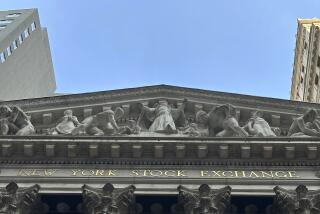Week in Review
Markets Tumble; Dow Closes Below Sept. Low
The bears were in full force on Wall Street, as stocks suffered severe declines and major indexes closed at multiyear lows amid fears of further selling Monday.
The Dow Jones industrial average crashed through its post-terror-attack lows--the last major index to do so--in a 390-point sell-off Friday.
It was the average’s seventh biggest point-drop ever. Analysts attributed the declines to Wall Street’s unwillingness to make any bets in a market that appears capable of falling further.
The declines also gave the three major indexes their ninth straight losing week.
Investors, fed up with accounting scandals and concerned that business isn’t recovering strongly or quickly enough, have been unloading shares for fear stock prices will continue to fall.
The Dow finished the week at 8,019.26, putting the average 216 points beneath the Sept. 21 close after the terrorist attacks.
*
Congress Deliberates on Corporate Reform
Under pressure from the White House and the public to act on corporate reform, House and Senate leaders began talks on the final version of legislation to crack down on accounting abuses, and set a goal of finishing work before Congress adjourns for its August recess.
House Republican leaders balked at speeding the process by simply accepting the more stringent bill approved unanimously last week by the Senate. Instead, they insisted on formal negotiations to reconcile differences between the Senate bill and a measure the House passed in April.
The Senate bill would create an independent board to oversee the accounting industry, limit the ability of accounting firms to do consulting work for companies they audit, ban corporate loans to company insiders and crack down on other business practices that contributed to the scandals. It also would add new penalties for fraud and make it easier to prosecute dishonest executives.
The House bill also would create an accounting watchdog panel, but its makeup and powers would differ from those proposed by the Senate. The House bill did not include the stricter penalties for corporate crime. However, the House passed a separate bill authorizing increased penalties--going further than the Senate in some respects and not as far in others.
*
Greenspan Gives Upbeat View of Economy
Federal Reserve Chairman Alan Greenspan said the nation’s economic recovery was on track, but warned Congress that corporate scandals threaten to injure the economy and should be treated with stiff new penalties for executives who cheat.
“The U.S. economy is poised to resume a pattern of sustainable growth,” the central bank chairman said. But only, he added, after current problems “linger for a bit longer ... and absent significant further adverse shocks.”
Greenspan’s remarks came as the Fed boosted its forecast of economic growth for the year to as much as 3.75% from 2.5% to 3%.
*
AOL Reorganizes Top Execs; Pittman Out
AOL Time Warner Inc. shook up its top management ranks in an effort to breathe new life into a hybrid company that has seen its vision for a digital future fade as its fortunes sank.
The latest casualty of the company’s miserable stock performance was Robert W. Pittman, who resigned under pressure as chief operating officer of the corporation and head of the struggling Internet flagship, America Online. Pittman, 48, had been a key architect of the merger between Internet giant AOL and entertainment powerhouse Time Warner. Pittman’s replacement by two veteran Time Warner executives puts the old-media executives very much back in control and leaves Chairman Steve Case without his closest ally.
Richard D. Parsons, the Time Inc. veteran who took over as AOL Time Warner chief executive in May, announced a new, two-legged structure for the sprawling company, intended to restore some of the autonomy stripped away by the merger. Don Logan, chairman and chief executive of Time Inc., will head a new Media & Communications Group consisting of America Online, Time Inc., Time Warner Cable and the AOL Time Warner Book Group and Interactive Video unit.
Jeffrey Bewkes, chairman and chief executive of HBO, will run the new Entertainment & Networks Group, including HBO, New Line Cinema, the WB Network, Turner Networks, Warner Bros. and Warner Music. Both executives will report directly to Parsons. And significantly, analysts said, both men tend to let subordinates run their operations as they see fit, providing that they produce results.
*
Coke, Post to Expense Stock Options
As corporate accounting scandals continued to roil the stock market, Coca-Cola Co. and Washington Post Co. said they will count employee stock options as normal business expenses, a move executives hope will boost investor confidence.
The move also may prompt other companies to follow suit.
In recent weeks, the use of stock options, once considered a valuable tool to link the interests of corporate executives to those of shareholders, has been cited as a potential culprit in the recent spate of accounting debacles.
Critics, including President Bush, have been looking for ways to rein in the practice of providing top corporate managers with huge grants of stock options, which give the right to buy company shares at a set price in the future.
*
Pfizer Agrees to Acquire Pharmacia
Drug giant Pfizer Inc. agreed to acquire rival Pharmacia Inc. for stock valued at nearly $60 billion, a deal that would create a leading international pharmaceutical firm.
Although investors, concerned about its price and timing, hammered Pfizer’s stock after learning of the deal, many analysts said the deal made strategic sense and could be expected to trigger a round of mergers as brand-name drug companies consolidate in the face of pressure from cheap generic competition.
Henry McKinnell, Pfizer’s chief executive, would serve as chairman and CEO of the new company; Fred Hassan, Pharmacia’s chairman and CEO, would be vice chairman and a board member.
Pharmacia, formed by the mergers of Pharmacia of Sweden with Upjohn and Monsanto, also would move ahead with previously announced plans to spin off its remaining 84% ownership of Monsanto to its current shareholders.
*
Southland Home Prices Hit New Record
Home prices surged in June to another record high across a wide swath of the Southland as falling mortgage rates and a tight supply of housing continued to boost property values.
The median cost of a Los Angeles County home jumped 18% from a year ago to $269,000, marking the eighth consecutive month that the county set a record price, according to DataQuick Information Systems Inc. In Orange County, the median price jumped 19% from a year ago to $359,000, reflecting the sharpest rate of increase for any month since May 1989, DataQuick said.
*
Intel to Cut Jobs in Limp PC Market
Intel Corp., still reeling from one of the chip industry’s worst downturns, posted anemic earnings and announced it would cut 4,000 jobs, or about 5% of its work force, by year-end.
The cut, on top of 7,000 jobs eliminated last year, suggests the worst is not over for the world’s largest semiconductor maker.
Emerging from a dismal 2001, Intel had joined numerous industry analysts in projecting a rebound in the second half of the year.
But corporations have been reluctant to upgrade their computers. Intel, whose chips run eight of 10 personal computers, relies on the strength of the PC market, which continues to sag.
*
Aerospace Firms Post Strong Earnings
Defense contractors, led by Northrop Grumman Corp., posted strong second-quarter earnings as the industry continued to benefit from an uptick in spending for weapons and homeland security after the Sept. 11 terrorist attacks.
Northrop, Boeing Co. and General Dynamics Corp., the nation’s top defense contractors, reported better-than-anticipated earnings, fueled mainly by new contracts and increases in sales of certain arms such as smart bombs, missiles and unmanned spy planes used in military operations in Afghanistan.
Lockheed Martin Corp. said second-quarter profit more than doubled on increased sales of aircraft and because of a tax credit.
*
Auto Makers Post Upbeat Results
Riding strong U.S. sales and aggressive cost management, General Motors Corp. said it beat expectations and earned an operating profit of $1.5 billion, or $2.63 a share. The results were about twice those of last year’s second quarter, when GM earned $766 million, or $1.37 a share.
Emerging from its disastrous financial performance last year, Ford Motor Co. said it turned a profit in the second quarter and probably would earn “a modest profit” for the year.
And the struggling Chrysler Group finally broke into net profitability in the second quarter, spurring its parent company, DaimlerChrysler, to a 52% leap in profit and to increase its earnings forecast for the full year.
*
Deutsche Telekom Chief Resigns Under Pressure
Deutsche Telekom Chief Executive Ron Sommer resigned, driven out of one of Germany’s top executive posts by election-year politics and angry shareholders who have watched the stock fall 90% from its peak.
The telecommunications giant’s supervisory board named former Chairman Helmut Sihler interim chief executive. The 72-year-old confirmed that his chief task would be to find a long-term solution to the leadership problem.
*
For a preview of this week’s business and economic news, please see Monday’s Business section.
More to Read
Inside the business of entertainment
The Wide Shot brings you news, analysis and insights on everything from streaming wars to production — and what it all means for the future.
You may occasionally receive promotional content from the Los Angeles Times.










